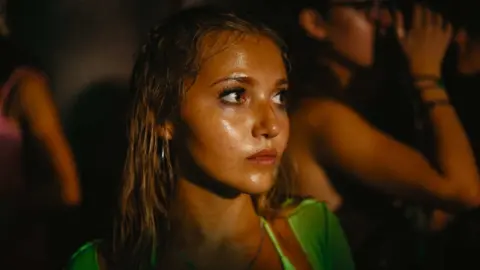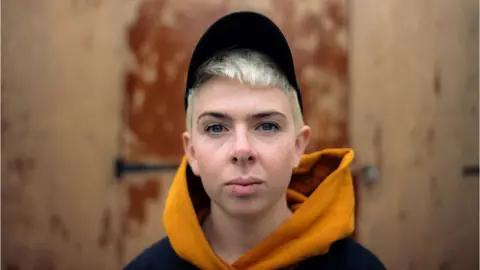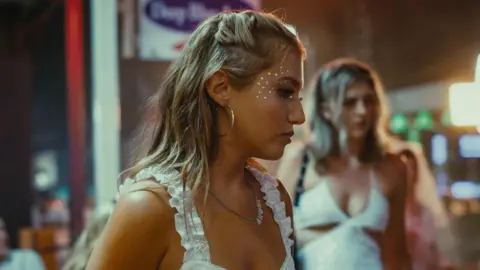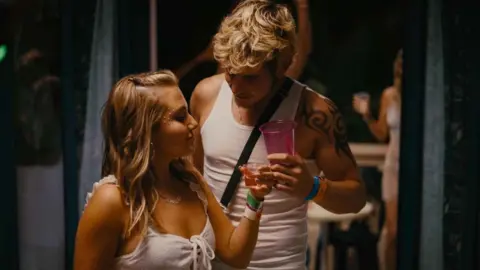How to Have Sex: The film that will get everyone talking about consent
 Phil Guy
Phil GuySexual consent and the "gap in understanding" about what sexual assault actually means is the subject of Molly Manning Walker's visceral debut feature film, How to Have Sex.
It is fair to say the rising star of British cinema has not taken the easy route.
The 30-year-old, who trained as a cinematographer, both wrote and directed her debut, which follows three female teens who excitedly head to a party town in Crete to celebrate the end of their GCSEs.
But while the exuberance of youth is gloriously celebrated in the bars and clubs of Malia, there is a dark underbelly to this tale of self-discovery as the trio navigate sex and consent.
Warning: themes of a sexual nature and discussion of sexual assault discussed below.
Persuasion actress Mia McKenna-Bruce takes the leading role as Tara, who is self-conscious about still being a virgin and finds herself in uncharted territory on a night out.
Manning Walker says the idea for the story came from a "formative memory" she has of seeing a man being given oral sex on stage during a bar crawl on a holiday she went on as a teenager.
"I started writing from there. We spent a bit of time in Malia doing research. We really tried to... engage with real life and what was going on. And then we did some workshops where we talked to 16-year-olds and their concept of consent, and it was quite wild what came out of that."
 Ed Frost
Ed FrostWithout giving too much away, Tara finds herself in two dangerous situations with one of the lads from the group staying in the apartment next door.
"For me, every woman I know has been sexually assaulted and not every man I know would claim to have had that experience or to have been a perpetrator. So I think there's a real gap there in what people understand as assault," says Manning Walker.
"And I think that's where we have to open the conversation up to allow men and women to discuss what's going on."
The film focuses on not just the perpetrator, Paddy (Samuel Bottomley), but also his mate, Badger (Shaun Thomas) who develops a genuine friendship with Tara.
Manning Walker said: "It was really important that we don't lock men out of the conversation. I wanted men to recognise themselves in the characters and although Badger is really fun...and sweet, he fails her [Tara] and he doesn't stand up at the right moment.
"He kind of enables his mate to continue the behaviour. And I think that's [what] we're trying to talk about ... don't assault people, that should be obvious. But... let's talk about stuff with our friends, let's care for other people. Let's make kindness more forefront in our lives."
While the film tackles a serious subject, it's certainly not all bleak.
 Phil Guy
Phil GuyThe film has some powerful shifts in tone, with switch-ups between light and dark, fun and fear, pure joy and intense despair.
Carefree moments are often quickly tempered with a growing tension that builds to a crescendo.
Manning Walker explains: "We designed the film in two halves. The first half is meant to be like this fun girls' holiday, escapism, light and airy.
"And then there's the second half. The camera style changes. Everything's dirty or more [expletive] up and the intensity of the performances... everyone feels it. The bass [music] gets deeper and darker, the crickets actually get louder and faster in the background. And this intensity just keeps going throughout the film."
The director is keen to point out that while Malia is a vehicle for the movie's narrative, sexual assault can obviously happen anywhere, not just on hedonistic group trips abroad.
"I don't want to put too much blame on these holidays because I had some of the best times of my life [on these types of trips]. These kind of things happen in all circumstances like in London in clubs, or when you go camping, or at music festivals. It happens wherever."
 Ambhur Burghall
Ambhur BurghallThe complexity of playing the role of Tara, who goes through so many mixed emotions and is fundamentally changed by the film's conclusion, was a challenge McKenna-Bruce relished.
She modestly stresses that her authentic performance was down to the camaraderie of the close-knit team of cast and crew, fostered by Manning Walker.
"It's 100% down to Molly and the cast. We all connected on a really, really deep level. The set in itself was super-supportive, super-safe from the get-go."
As is common practice in the modern-day film industry, the production employed an intimacy co-ordinator, who protects and guides actors filming intimate scenes.
"It was the first time I've worked with an intimacy co-ordinator, which is insane," McKenna-Bruce tells me.
"To me, it's crazy to think that you wouldn't have intimacy co-ordinators in the same way that you'd have stunt co-ordinators. You wouldn't expect someone to do a fight without a stunt co-ordinator. We choreographed everything to a tee."
The film also tackles toxic female friendship and peer pressure, with Tara's friend Skye (Lara Peake) often putting her down and making fun of her lack of sexual experience.
"I didn't want it to be just coming from the men. I wanted it to come from all angles," says Manning Walker.
"We get to see those glimpses with Skye, like her mum not being present," says McKenna-Bruce.
"It's projection and you allow yourself to take these jabs from people for their benefit. And that's something that you don't have to do."
While secondary schools do teach consent as part of the RSHE curriculum, Manning Walker thinks more could be done.
"It's so binary, so law-based and for me, I'm like, 'you have to stop thinking … the police are going to protect us'.
"We're trying to get a sex education situation going, we really want to take it [the film] into schools," she adds.
She said: "We've had amazing experiences, like an older man watched it and said that he realised that he'd been Paddy, and also young people saying thank you for making something that makes us feel so seen."
The Schools Consent Project sends lawyers into schools to teach consent to 11 to 18-year-olds.
Founder Kate Parker told the BBC: "Films like How to Have Sex are essential in bringing these conversations to a wider audience.
"Consent can often be seen as a clunky legal term; these sorts of films reframe it in a disarmingly relatable way. They encourage their audiences to really scrutinise what consent looks and feels like, what a violation is, how to articulate that, and what to do when other factors are involved: alcohol, drugs, peer pressure, etc."
Daniel Guinness of Beyond Equality, a charity that helps boys and men rethink masculinity to empower them, says:"It's important for men to understand that they also have the right and the ability to give their consent or not give their consent to things.
"And it's [also] important for men and boys, because at the moment, they are the ones who are perpetrating more of the sexual violence. It's really important they're very aware about the need for them to be checking in with any partner that they have."
And while controversial influencers such as Andrew Tate have arguably made conversations around consent more difficult for young people, McKenna-Ball is glad women's voices are being heard.
"I think with voices like Molly's in the industry, that in itself is moving forward. I feel like this didn't exist for me growing up. So the fact that it does now is a step in the right direction.
"Obviously [there's] a lot further to go... as much as there's a lot that's still very, very hard to deal with and frustrating, there is movement and there is light at the end of the tunnel."
If you have been affected by any of the issues discussed in this story you can find help and support at BBC Action Line.
Additional reporting by Rebecca Swash.
How to Have Sex is in cinemas across the UK.
